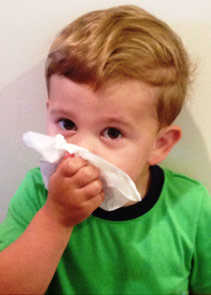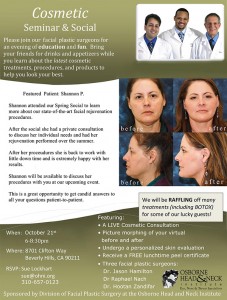- New Sublingual Allergy Tablets - October 31, 2014
- Ground-breaking New Treatment Option for Sleep Apnea - September 27, 2014
- Allergies versus Viruses in Children - September 27, 2014
- “Dog Dust” Protects Children from Allergies - September 27, 2014
- Nasal Saline Irrigation - August 8, 2014
- Doctor, I am Allergic to Dust. What Can I do? - July 31, 2014
- Infants Exposed to Dust Mites Less Likely to Develop Allergies - June 23, 2014
- How to Treat a Young Child’s Cough - December 17, 2013
- Many Parents are Unaware That Their Children Are at Risk for Noise Induced Hearing Loss - December 9, 2013
- Is it a Cold or an Ear Infection? - December 9, 2013
Question: My son always seems to have a runny nose. We have been seen by our pediatrician many times for this issue, and she keeps telling us that he has a virus. He never seems to get that much better. Can he possibly have a virus for such a long time? Is it okay for his nose to be running like this all the time?
 Runny noses commonly plague young children. It is very difficult for parents to figure out the cause of the runny nose. Does their child have frequent colds or are their symptoms due to allergies?
Runny noses commonly plague young children. It is very difficult for parents to figure out the cause of the runny nose. Does their child have frequent colds or are their symptoms due to allergies?
Why are allergies confused with viruses?
Allergies and viruses present with very similar symptoms, including:
- Runny nose
- Clear nasal discharge
- Headache
- Fatigue
- Low grade fever
Because these symptoms may be either allergic or viral, the two are often confused. To make matters more complicated, children can have 7-10 viral “colds” a year which can make it seem like they are continuously sick and always have a runny nose. Allergies similarly may be year-round, making the two even more likely to be confused.
How can I tell if my child really has a virus or if it is just allergies?
Viruses are more likely to occur during respiratory season, which starts in late August or early September and lasts until March or April. Allergies may occur during this season but also tend to occur in spring and summer. A child who is symptomatic in May is more likely to be allergic than to have a cold, although this is not absolute. Trees, grasses and weeds often cause seasonal allergies. However, year-round symptoms will occur in the child who is allergic to dust mites, cockroach, and pet dander (if there is a household pet).
Viral colds usually last for 7-10 days and are self-resolving, whereas allergies tend to persist for longer periods of time. Allergies may get intermittently better and worse, and so the cycle may seem like one cold after another, making the diagnosis confusing.
Viruses and allergies both may predispose a child to develop sinusitis, cough, or asthma. A swollen moist nose from a viral infection or allergies is a great place for bacteria to thrive, which can lead to sinusitis. Again, this makes diagnosis difficult.
Does it matter if my child has allergies or a virus?
There are many health risks associated with untreated allergies. Unlike a virus, which resolves, usually without complications, untreated allergies result in prolonged periods of nasal congestion and excess mucous production. This predisposes the child to:
- Chronic nasal obstruction and mouth breathing
- Chronic sore throat and bad breath
- Hoarseness
- Snoring and sleep disturbances, which may affect school performance
- Chronic sinusitis
- Chronic cough
While viruses may also causes these issues, it is far less common, which is why standard treatment for a virus is simply conservative care and observation. Allergies, on the other hand, must be treated to avoid the development of these complications, and others, including skeletal and facial issues from chronic mouth breathing.
If you have concerns that your child may have allergies or complications from allergies or recurrent viral infections, seek evaluation by a Pediatric Otolaryngologist to determine the underlying contributing factors and develop a comprehensive treatment plan.
To learn more about Dr. Belinda Mantle or allergies, please visit www.ohni.org.



